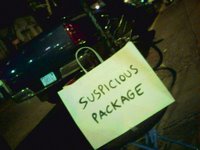 On May 10, 2005, Mimi Hall at USA Today reported, "The Bush administration periodically put the USA on high alert for terrorist attacks even though then-Homeland Security chief Tom Ridge argued there was only flimsy evidence to justify raising the threat level, Ridge now says." Hall noted that "The level is raised if a majority on the President's Homeland Security Advisory Council favors it and President Bush concurs. Among those on the council with Ridge were Attorney General John Ashcroft, FBI chief Robert Mueller, CIA director George Tenet, Defense Secretary Donald Rumsfeld and Secretary of State Colin Powell."
On May 10, 2005, Mimi Hall at USA Today reported, "The Bush administration periodically put the USA on high alert for terrorist attacks even though then-Homeland Security chief Tom Ridge argued there was only flimsy evidence to justify raising the threat level, Ridge now says." Hall noted that "The level is raised if a majority on the President's Homeland Security Advisory Council favors it and President Bush concurs. Among those on the council with Ridge were Attorney General John Ashcroft, FBI chief Robert Mueller, CIA director George Tenet, Defense Secretary Donald Rumsfeld and Secretary of State Colin Powell."On October 12, 2005, MSNBC's Keith Olbermann outlined how thirteen homeland security alerts followed political crises for the Bush Administration, mainly in the run-up to the 2004 elections, raising the possibility that the powers-that-be might time their homeland security alerts to recover from political setbacks.
In a July 7, 2006 item for Time, Joshua Micah Marshall noted that the drumbeat of homeland security alerts basically ceased following the 2004 elections and warned that
In these perilous days, we must be ready to think the unthinkable. No, I don't mean the possibility of a catastrophic terrorist attack. After 9/11, that's all too easy to imagine. No, I'm talking about a thought that even now seldom forces its way into respectable conversation: the quite reasonable suspicion that the Bush Administration orchestrates its terror alerts and arrests to goose the GOP's poll numbers.The use of fear to foster popular compliance with standing governments is not a new concept. It plays a major role in George Orwell's 1984. And so does doublethink.
 I wish I could be less suspicious of the Bush administration's declarations. But its documented use of false and misleading and contradictory information to "justify" very serious actions--such as going to war with Iraq--makes me very skeptical.
I wish I could be less suspicious of the Bush administration's declarations. But its documented use of false and misleading and contradictory information to "justify" very serious actions--such as going to war with Iraq--makes me very skeptical. The administration's continuing efforts to distort reality are just as disturbing. Early this month, when challenged on his policies before the Senate Armed Services Committee, Secretary of Defense Donald Rumsfeld claimed that he had "never painted a rosy picture," that he has "been very measured" in his previous statements, and that one would "have a dickens of a time trying to find instances where I've been excessively optimistic." New York Senator Hillary Clinton quickly provided evidence to the contrary, as outlined at Media Matters for America. Some examples:
On November 14, 2002, Rumsfeld told Steve Kroft, "I can’t tell you if the use of force in Iraq today would last five days, or five weeks, or five months, but it certainly isn’t going to last any longer than that.”And lately there's been word that on May 6, 2002 President Bush authorized then-EPA head Christine Whitman to suppress information about toxic air around Ground Zero, for "national security" purposes.
Another example: On December 18, 2002, Rumsfeld told Larry King that "The Taliban are gone. The al Qaeda are gone."
Yet another example: On March 30, 2003, Rumsfeld told George Stephanopolous, "We know where [Saddam Hussein's weapons of mass destruction] are. They're in the area around Tikrit and Baghdad and east, west, south and north somewhat."
So it seems that members of the Bush administration are on the record issuing at least three types of extremely misleading messages. There are the too rosy messages (the air at Ground Zero is fine, the Taliban is gone, al Qaeda is gone), the self-denials (Rumsfeld claiming that he'd never painted optimistic or rosy pictures, those early government claims that no one could have imaged in the 9/11 attack, etc.), and the too alarming pronouncements (Saddam Hussein definitely has weapons of mass destruction).
When it comes to alarming statements related to national security and intelligence (the homeland security alerts, the claim about weapons of mass destruction), it's hard for mere civilians to know how reliable they are. Yet, while media outlets should be more aggressive in countering Bush administration deceptions with hard facts, we often know enough (through those media outlets and the Bush administration's own recklessness) to know that Bush administration pronouncements are highly suspect and untrustworthy. The lack of credibility can be a serious danger in itself--to the reputations and careers of the Bush administration as well as to the well-being of the rest of us, especially during a time of crisis.




No comments:
Post a Comment